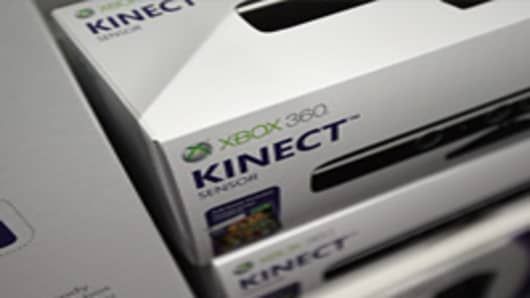With backings by Oprah Winfrey, Ellen DeGeneres and just about every gift guide the media has written, Kinect for the Xbox 360has become the “must have” gift of the 2010 holiday season.
The motion capture device has sold more than 2.5 million units since its Nov. 4 launch and Microsoft seems well on pace to meet its sales target of 5 million before the end of the calendar year. But do those sales mean it’s time to buy Microsoft shares?
Jefferies and Co. seems to think so. The analyst on Wednesday raised its holiday quarter estimates for the company to $19.1 billion/ 69 cents per share—a $600 million/3 cent per share bump—based solely on the strength of Kinect.
“Kinect appears to be the fastest-selling device ever,” the company wrote in a note to investors. “It is selling at 2.5x the rate of the iPad since debut. … Kinect sales are likely to slow post the holiday season. Still, the technology has applicability beyond gaming, and we see Kinect as an important psychological win for Microsoft as it seeks to regain relevance in consumer tech.”
In November, Kinect outsold Sony’s PlayStation Move by a 5 to 1 ratio at retail—a significant victory in the video game industry’s new motion controller wars. More importantly, the device seems to be attracting new gamers. Michael Pachter of Wedbush Securities says roughly half of the Xbox 360s sold last month were bundled with Kinect.
That means Microsoft is growing its audience—which could have long-term positive effects for the company, assuming it keeps a steady flow of quality titles coming. So far, the company hasn’t given a lot of guidance on its 2011 lineup of Kinect titles, but games like “YooStar 2”—which lets players insert themselves into classic movie and television scenes—and an untitled “Star Wars” game have been enough to keep consumers excited.
"Just before the launch, Microsoft increased its forecast for worldwide sales from 3 million to 5 million. This forecast seems conservative now, given the strong reception.""
Beyond selling software, Kinect is also likely to boost subscriptions to Xbox Live—Microsoft’s online gaming service—which carries a $60 per year fee for premium services. It could also encourage some of the current Xbox Live members who don’t subscribe to the premium service to sign up. (Currently only half of the 25 million Xbox Live members pay for the service, but the service still pulled in revenues of $1.2 billion last fiscal year.)
Earlier this week, Caris & Co. analyst Sandeep Aggarwal issued a note saying he expected Kinect would give Microsoft a $1.2 billion boost in its first year. Add in software purchases and that estimate hits $2 billion in gross revenue.
A good share of that revenue will be profit, too. A teardown of Kinect by UBM TechInsights estimates that the components of the controller cost roughly $56 (versus a selling price of $150). Even with manufacturing and marketing costs—as well as retailers getting their share—that’s a hefty margin for Microsoft.
“Just before the launch, Microsoft increased its forecast for worldwide sales from 3 million to 5 million by the end of the year,” said Aggarwal. “This forecast seems conservative now, given the strong reception.”
Keep in mind, though, that even if Microsoft hits its sales targets – or even exceeds them – Kinect will make up a tiny percentage of the company’s overall revenue, which topped $58 billion in fiscal 2009.
But it escalates the company’s profile in the important consumer electronics space, and if Microsoft’s Entertainment and Devices Division can ensure a steady flow of quality software that differentiates itself enough from offerings by Sony and Nintendo, Kinect could manage to hold on to its status as something that is truly unique and maintain its retail magic after the holidays—which was key to the Wii’s success.
“Kinect has been more successful than a lot of people thought it would be,” notes John Taylor of Arcadia Research. “It definitely has demonstrated some magic and continues to sell really well.”


